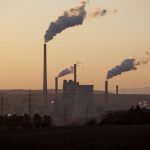The Tragedy Of The Corporations (A Thought Experiment)
- Categories:
- Climate Change
- Poems

Imagine.
A friend tells you that the high rise building in which you both live is on fire and you need to raise the alarm. The blaze started in the oil-powered furnace in the basement. You live on the 10th floor so are not in immediate danger but you know that every minute that the fire is allowed to burn will risk the lives of everyone in the building. But every time you pull a fire alarm switch, it is quickly deactivated by the powerful corporations based in the top floor penthouse.
They then pay their media and PR people to travel through the building saying that there is no fire and everyone should go about their business as usual. You point to the smoke coming up from the basement. They eventually change their story, saying that the smoke is an unavoidable by-product of the vital oil-powered heating system and that it can be dealt with at a later time.
As those top floor corporations bankroll most of the building management group, they can rely on their support at critical times like this. So the governing group tell everyone that the risks are low and dealing with this issue right now would cause too much upheaval for everyone in the building. They promise to deal with it later, after some amazing new technologies have been invented.
The powerful corporations do realise that the fire in the basement may eventually consume the whole building, but they are currently meeting to finalise a lucrative deal and don’t want their profitable venture to be derailed by fire alarms, evacuations, and fire suppression methods. They are not afraid for their own safety because their top floor penthouse has higher levels of fire protection than the rest of the building.
They demanded extra fire protection for themselves because numerous academics had highlighted dangerous design flaws in the system being used to heat the building. The corporate elites figured that they would have plenty of time to make obscene amounts of money from their various business ventures on the top floor before the inevitable blaze erupted in the basement. So they now carry on with business as usual while the building burns from the basement up.
Some people soon die of smoke inhalation on the ground floor because they are too frail and vulnerable to flee. Others migrate to higher floors in a desperate attempt to escape the smoke, heat, and explosions. Many die in the ensuing chaos and stampede. Some of the residents of upper floors are welcoming and helpful. They know that they could be in the same situation themselves before long. Others are fearful and hostile, pushing the desperate residents back.
Eventually, you and a small group of residents manage to reach the huge fire doors protecting the top floor penthouse. You bang on the heavy doors, begging for help, as the flames consume the lower floors. But your pleas are not answered. Inside, the meeting has ended. The newly minted trillionaires congratulate each other. They finally pull the fire alarm switch, thinking that this will give them just enough time to be evacuated from the helipad on the roof. They recently ripped out the communal roof gardens & wildlife sanctuary to build their private helipad for just such an eventuality.
But the fire alarm does not sound. An unforeseen explosion triggered a chain reaction which eventually fried the fire and security systems. This caused a building-wide lockdown with no way in or out, and no functioning fire suppression options. After decades of budget cuts, the building’s fire fighters, on the ground floor, are ill-equipped to tackle such a large inferno. But they do their best with what they have.
The corporate elites are horrified to discover that they are trapped in the burning building, just like everyone else. After a couple of terrifying hours, they are engulfed by an intense explosion. Every single soul in the building perishes. Their fate was sealed by the greed and short-sightedness of a small group of very powerful corporations on the top floor, and the corrupt governing system which they helped to create.
It did not have to end like this. In a parallel universe, the powerful corporations did not obstruct the efforts to extinguish the fire, but actively helped to tackle the blaze; they also helped to finance a renewable energy system which was cheaper, cleaner, and did not threaten the lives of everyone in the building.
In that other world, the building’s governing body actually represented the needs of the occupants instead of the whims of their paymasters, and more media organisations accurately represented the issues, rather than amplifying the views of the media barons who own them. In that alternate reality, every soul in the building survived and thrived, in a more democratic and equitable environment. It was a building built and run for the many, not the few. The powerful corporations recognised that extractive capitalism was unsustainable and morally corrupt, choosing instead to put people over profit.
This fictional story is somewhat analogous to the crises we face in relation to climate change, ecological collapse, and growing inequality. Our planet is on fire, literally and metaphorically. After just 1.2 C of warming (above pre-industrial levels), we are now seeing more frequent and intense wildfires, heatwaves, droughts, crop failures, storms, floods, thawing of permafrost, and catastrophic ice sheet collapse. Devastating biodiversity loss is further destabilising many natural systems, making it even harder for Mother Nature to draw on her natural resources to rebalance and regenerate ecosystems as the planet heats up.
If we do not take immediate action, we will soon overshoot the 1.5 C global heating threshold beyond which the impacts become truly devastating, affecting every living thing on Earth in frightening and unpredictable ways. Impoverished people who have done the least to cause this global heating, have the greatest levels of climate vulnerability. They are losing their lives, livelihoods, and cherished places right now. We must act now to limit global heating. We cannot afford to wait until 2030 or 2050. The longer we wait, the harder the task becomes.
Some rich and privileged people may think that they will accumulate enough wealth in the short-term to protect themselves from the climatic, ecological, societal, cultural, psychological, and economic turmoil that may be unleashed, if we stay on this destructive path. But it is impossible to know exactly when certain chain reactions will happen and where they will lead. Escape plans are never foolproof. Especially when devised by shortsighted fools. We are in a climate, ecological and societal emergency.
When your home is on fire and your loved ones are trapped inside, every second counts. It is long past time for all of us – individuals, media organisations, local and National governments, small businesses and trillion dollars corporations – to raise the alarm with everyone around us, and work together to put the fire out as quickly as we can. We all need to act like our lives and those of our children depend on it, because they do. By working together to tackle the burning issues of our time, we can create a fair and balanced world for all.
Co-founder of SearchScene.com, the charitable search engine that protects the living planet, and your privacy, while you search the web.
Written: 20th November 2021.
Background:
The title of this piece is a variation of, ‘The Tragedy of the Commons’, an essay published in the journal Science, in 1968, by the ecologist and biologist, Garrett Hardin. The ideas underpinning his essay have been challenged by many, including Elinor Ostrom, the Nobel Laureate in Economics. The following article by award-winning Science Journalist, Michelle Nijhuis, offers an insightful discussion of the issue: “The miracle of the commons: Far from being profoundly destructive, we humans have deep capacities for sharing resources with generosity and foresight.”
I sincerely hope that this burning building analogy is not distressing for anyone who has experienced a fire-related tragedy in real life (e.g. the Grenfell Tower fire). My hope is that the analogy may help some people to see the escalating climate, ecological and societal emergencies in a different way; a way that connects with their primal instinct to protect the things that they love, and to stand againt injustice and corruption when they see it.










